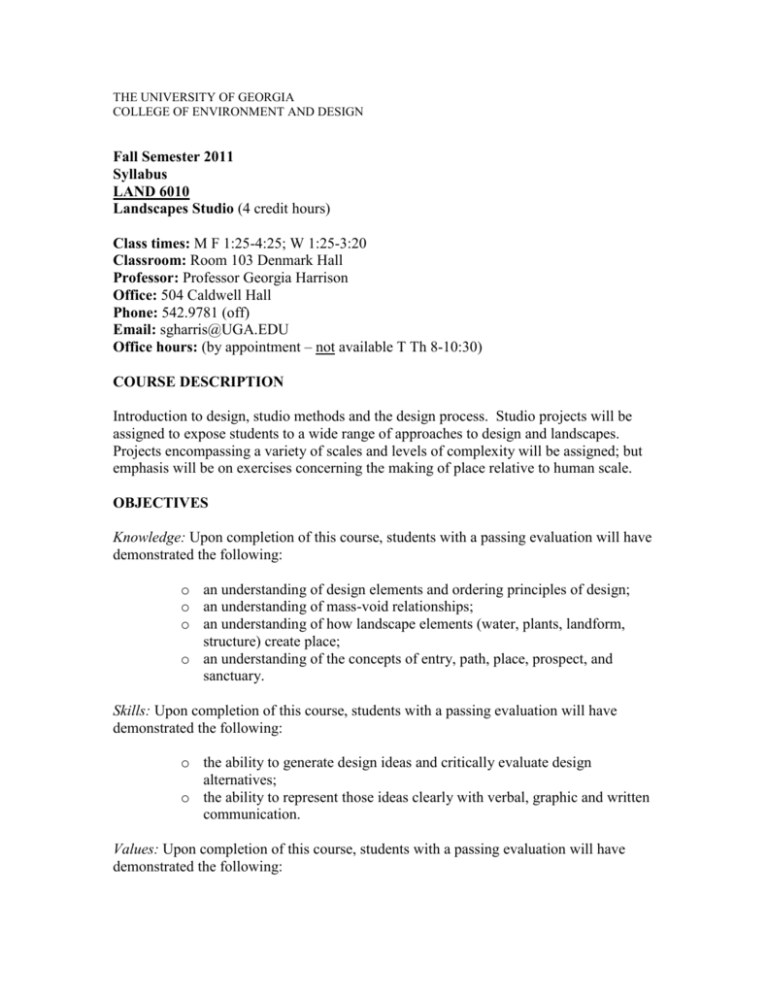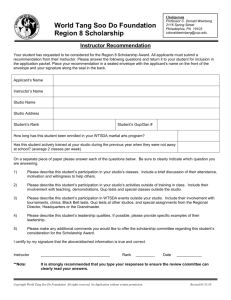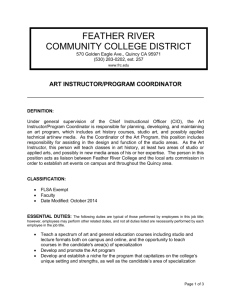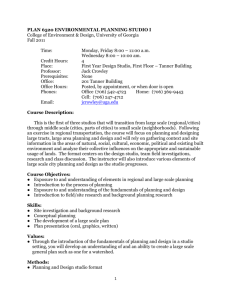LAND 6010 - College of Environment + Design
advertisement

THE UNIVERSITY OF GEORGIA COLLEGE OF ENVIRONMENT AND DESIGN Fall Semester 2011 Syllabus LAND 6010 Landscapes Studio (4 credit hours) Class times: M F 1:25-4:25; W 1:25-3:20 Classroom: Room 103 Denmark Hall Professor: Professor Georgia Harrison Office: 504 Caldwell Hall Phone: 542.9781 (off) Email: sgharris@UGA.EDU Office hours: (by appointment – not available T Th 8-10:30) COURSE DESCRIPTION Introduction to design, studio methods and the design process. Studio projects will be assigned to expose students to a wide range of approaches to design and landscapes. Projects encompassing a variety of scales and levels of complexity will be assigned; but emphasis will be on exercises concerning the making of place relative to human scale. OBJECTIVES Knowledge: Upon completion of this course, students with a passing evaluation will have demonstrated the following: o an understanding of design elements and ordering principles of design; o an understanding of mass-void relationships; o an understanding of how landscape elements (water, plants, landform, structure) create place; o an understanding of the concepts of entry, path, place, prospect, and sanctuary. Skills: Upon completion of this course, students with a passing evaluation will have demonstrated the following: o the ability to generate design ideas and critically evaluate design alternatives; o the ability to represent those ideas clearly with verbal, graphic and written communication. Values: Upon completion of this course, students with a passing evaluation will have demonstrated the following: o an appreciation for the importance of high-quality design in the built environment; o an appreciation for the work of the masters or “heroes” of landscape architecture. METHODS This is a studio format course supplemented with lectures, readings, in-class discussions, critiques and possible field trips. Impromptu pin-up sessions will occur periodically along with scheduled formal reviews. Students are expected to be in studio, working diligently at their desks, the entire time allotted to this class, unless directed otherwise. An essential part of learning derives from the shared experience of working with classmates in a high energy environment. Students are strongly encouraged to continue assigned work in the studio after class hours as well. Students are expected to keep a sketch journal as a companion to their studio work to help develop design ideas and expression. Sketchbooks are for private use, but students may choose to use them as a means of sharing ideas during desk critiques. Studio emphasis will include the use of sketch and overlay method as the primary design approach. All drawings will be prepared by hand-drawing. Your AutoCAD skills will be developed after this class. MATERIALS Basic drafting equipment including, but limited to: parallel bar, or “Mayline” (preferred over t-square) triangles technical drafting pens flairs or sign pens lead pencils with H and HB leads (use either a lead pointer or standard wooden pencils - do not use mechanical pencils for either drafting or sketching), sketchbook: Strathmore 400 Series (or equal) (8”x10” or 8.5”x11”) 314 pencils vellum 24” and 12” tracing paper black binder clips (medium small) Most of these will already be in your graphics kit. Additional papers and materials that are required will be announced at the beginning of each project. Please keep a roll of 12” tracing paper at your desk for studio critiques, as well as for efficiency in generating multiple variations of a design idea. A recommended variation on the T-square is a (Mayline) parallel bar, or straightedge. These may be purchased through Dataprint or GS Direct online at reasonable prices. You may attach it directly to the Borco board cover on your desktop. Each year you would transfer it to a different desktop. READINGS Required: Ching, Francis. Architecture: Form, Space & Order Recommended: Alexander, Christopher. A Pattern Language Crowe, Sylvia. Garden Design Dee, Catherine. Form and Fabric in Landscape Architecture Edwards, Betty. Drawing on the Right Side of the Brain Lynch, Kevin. Site Planning Peterson, Bryan. Using Design Basics to Get Creative Results Tuan, Yi Fu. Space and Place: The Perspective of Experience (Additional readings may be assigned periodically to accompany project assignments.) PROJECTED SCHEDULE AND DEADLINES The following event dates, projects and anticipated deadlines are approximate and subject to change: Assignment 1 (3 classes) Composition in Black and White (Due: August 22) Assignment 2 (3 classes) Composition #2 (Due: August 26) Assignment 3 (2 classes) Figures in Light and Shadow (Due: August 31) Labor Day Holiday No Class (September 5) Assignment 4 (2 classes) Wall & Ceiling/Land Art (Due: September 7) Assignment 5 (2 classes) Observations of Path & Place (Due: September 12) Assignment 6 (12 classes) Tunnel (Model Due: September 26; Boards Due: October 10) Assignment 7 (7 classes) Design Analysis (Due: October 26) Fall Break No Class (October 29) Assignment 8 (14 classes) Sculpture Garden (Pinups: November 2, 7, 9, 14; Final Due: December 9) Projects and performance are anticipated to receive the following relative weights (subject to minor revision): Class Participation/Attendance/Professionalism: Figures in Light and Shadow Composition in Black & White Composition #2 in Black & White Wall/Ceiling/Landscape Observations of Path & Place Tunnel Design Analysis Sculpture Garden 4% 2% 3 or 7% 3 or 7% 7% 7% 25% 20% 25% GRADING SYSTEM Performance will be based on the University system with percentages as follows: A=90% and above Work reflects superior design and graphic ability, logically thought out and presented. Changes or revisions would be minor. B=80% to 89.9% Work shows a good understanding of the theory and concepts involved in the project, but must be slightly reworked. C=70% to 79.9% Work indicates a satisfactory understanding and execution of the project. Moderate revisions would be necessary. D=60% to 69.9% Work is incomplete and demonstrates poor or inconsistent design process and project solution. F=59.9% and below Work is unacceptable, generally incomplete and shows a failure to comprehend and present subject matter. Plus/minus grades will be assigned according to the following scale: A = 94 to 100 A- = 90 to 93.9 B+ = 87 to 89.9 B = 84 to 86.9 B- = 80 to 83.9 C+ = 77 to 79.9 C = 74 to 76.9 C- = 70 to 73.9 D = 60 to 69.9 F = 0 to 59.9 CLASS STANDARDS Conduct: Because this is a graduate level course, students will not be lectured on the importance of attending class. Having stated that, role will be taken at the beginning of each class, and if a student establishes a regular and persistent problem of missing classes or arriving late, action will be taken, on advisement from the graduate coordinator, that may impede the student’s further progress in this degree program. A surly or uncooperative attitude towards the teacher or fellow classmates will also not be tolerated and will be considered a sign of the student’s lack of interest and commitment in continuing the program. Due dates and deadlines: Assignments must be submitted on the stated due date, time and place. If work is not submitted as specified by the instructor, the grade will be reduced one letter grade per day. Work missed due to illness is required to be submitted no later than one week from the student’s return to class. Other situations will be dealt with on a case by case basis between the student and the instructor outside of class time, and arrangements will be made in writing, signed by both the student and instructor. Please do not attempt to discuss late work or absences at the beginning of a class period. Grades: If a student wishes to protest a grade assigned to a project, the request must be made in writing and submitted to the instructor. No discussion of such grades will occur during class periods. During class times there will be no music played in the studio and no use of alcohol or tobacco of any kind. Please observe common courtesy and good judgment when working in the studio at all times. Smoking in classrooms and alcohol use on state property are banned by state law. All students are responsible for knowing the University’s policy on academic honesty. All academic work submitted in this course must be your own unless you have received the instructor’s permission to collaborate and have properly acknowledged receiving assistance. It is the instructor’s responsibility to uphold the University’s academic honesty policy and report any suspicions of dishonesty to the Office of the Vice President for Instruction. Students who know or suspect that they have any type of learning disability must inform the instructor of such disability in writing before the third class meeting. The instructor will work with the University Counseling and Testing Center to accommodate the needs of such students. Without such notification, no special accommodations will be considered at any later date. Students with documented learning disabilities are served by the Learning Disabilities Center in Aderhold Hall (542-4589). Documentation: Students may be asked to submit scans of some or all semester work to the instructor on CD at the end of the semester in order to obtain a course grade. Clarification of exact expectations and format will be given at the end of the semester. Some original work may be kept by the instructor after the completion of the course for accreditation and documentation purposes. All work produced in classes is the property of the University of Georgia.




